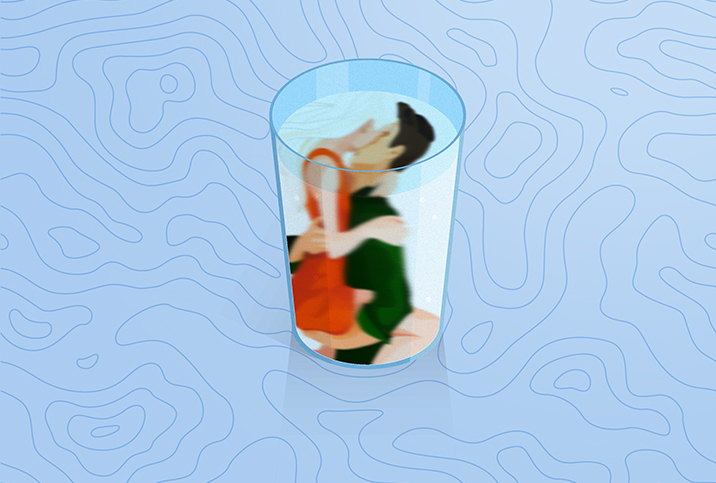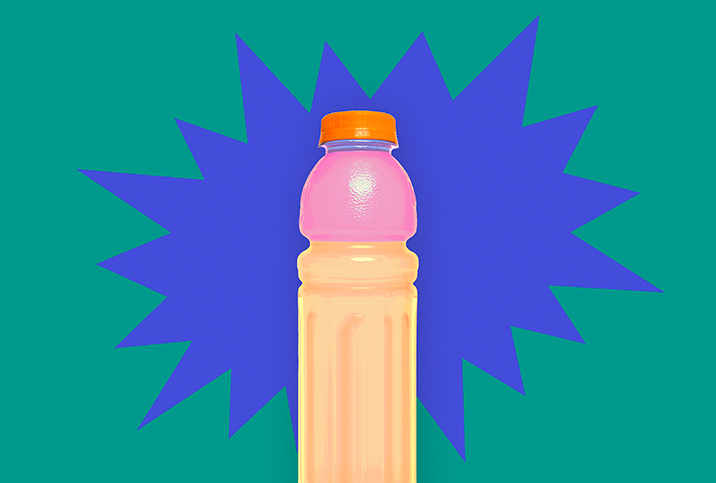Are You Drinking Enough Water—Or Maybe Too Much?

Growing up, most of us heard that it's imperative to drink eight glasses of water per day. Seems like an easy goal, which may be perfect for you.
In an updated recommendation, however, the U.S. National Academies of Sciences, Engineering and Medicine indicated the following daily targets for water intake in a temperate climate:
- 11 to 12 cups of fluids for women
- 15 to 16 cups of fluids for men
There is a caveat, though: 20 percent of this fluid will inevitably come from food and drinks other than water.
Current guidelines suggest drinking as much water as your body needs. In fact, there is no collective formula, exact number or simple answer, because it depends on several factors, which are different for everyone.
"Our bodies are 55 to 60 percent water," said Doni Wilson, N.D., a nutrition specialist and bestselling author in New York City. "If we don't drink enough, or for that matter, drink too much, it's going to throw things off."
Are you drinking enough water?
In a OnePoll survey carried out in England in January 2023, surveyors found that the average person drank roughly four glasses of water per day. The reasons for insufficient water intake include forgetting to drink (49 percent), being unsure about how much they drink per day (40 percent) or having too busy of a schedule to drink regularly (24 percent).
Perhaps unsurprisingly, 24 percent of people surveyed said they prefer to hydrate with a cup of tea.
"People tend to under-hydrate. The important thing is to educate them with certain tips, so they can determine how much water they need," said Rossana Suárez Parra, M.D., a specialist in internal medicine and nutrition in Valencia, Venezuela.
Given water's importance to the body, hydration is the first thing you should keep in mind if you feel unwell, according to Wilson. If you have symptoms such as fatigue, constipation, diarrhea, headache, high blood pressure, bladder infections or kidney stones, your water intake should be one of your first checkpoints.
"We need water for our blood to flow, for our bowels to move, for nutrients to move in and out of our cells, and for toxins to get out of our bodies," she added.
Low fluid intake is equally reflected in poor performance of physical activities, in addition to triggering cramps due to loss of electrolytes, Suárez said.
Dehydration and your sexual health
"Proper hydration and nutrition are essential for good psychological and sexual health," said Mónica Sánchez, M.S., a psychologist and expert in sexuality in Murcia, Spain.
"It can affect sex as well," Wilson said. "We need water to make bodily fluids. This is true for men and women. We also need water, as well as electrolytes, in order to keep our muscles working well."
Sánchez noted your physical, emotional and sexual health are interrelated. When you're not well physically or emotionally, your mind can't focus on sexual arousal and enjoyment.
"We also know that poorly hydrating can physically impact our blood circulation," she added. "If that blood is not concentrated in the genital area there is no erection and no arousal."
Likewise, dehydration can lead to exhaustion, decreased strength and mood swings such as irritability, all factors associated with sexual health.
"Tiredness, stress, exhaustion in general, makes our sexual desire either diminish or disappear," Sánchez said.
What happens if you drink too much water?
A study published in Clinical Kidney Journal in December 2022 suggested legendary martial artist and actor Bruce Lee could have died of hyponatremia. It's a condition that occurs when there is an excessive amount of water in the body that can't be eliminated. This is also known as water intoxication.
The official cause of Lee's death was a cerebral edema caused by hypersensitivity to Equagesic, a combination tranquilizer-analgesic used to treat pain.
"Hyponatremia is uncommon, unless more water enters the body than is eliminated in urine, either because the kidneys don't have time to eliminate it or our kidneys have limited capacity to excrete water," said co-author María Vanessa Pérez Gómez, M.D., a specialist in nephrology in Madrid.
The researchers reached their hypothesis while preparing material for a MOOC (massive open online course) on kidney function. They analyzed the evidence from a nephrology perspective and found multiple risk factors.
"Bruce Lee had several risk factors, among which we can mention high water and fluid intake, which, in part, may have been stimulated by marijuana use, low solute diet, drugs and others," Pérez said.
The more risk factors that affect kidney capacity, the greater the risk of developing hyponatremia despite not drinking significant amounts of water, she added.
Pérez's research team additionally analyzed the case of a 45-year-old man who died after drinking six liters of beer (one and a half gallons) in 20 minutes at a competition in Spain in 2013. They suggested the cause of death was hyponatremia.
These kinds of challenges are common at American universities, too. In 2005, a 21-year-old student at California State University died due to water intoxication during a fraternity hazing.
But it's not just "crazy kids" out for a good time. In 2007, a 28-year-old female contestant on a California radio show died after drinking nearly two gallons of water in two hours to win a video game console for her children. The game involved drinking as much water as possible without urinating.
"Lack of understanding of how the kidney functions can have serious consequences," Pérez said. "There are multiple examples in the news, but deaths from excessive water intake still occur."
You don't need to be in college or on the radio to put your body at risk. Fad diets can create challenges your body will struggle to deal with. For example, a very restrictive or liquid-only diet for prolonged periods of time may lead to malnutrition, loss of muscle mass and a rebound effect, Suárez said.
How much water is right for you?
Thirst is the simple way your body reminds you to hydrate. You can check your urine, too. For instance, if it's a dark yellow color, you should drink more water. However, keep in mind, your kidneys need time to flush out fluids.
"I tend to recommend that people don't try to drink a whole bunch of water at once, and not right when you're eating," Wilson said. "It's better to spread it out through the day—4 to 6 ounces at a time."
The amount of water for each person is different. This can range from 0.9 liters (31 ounces) per day for one person to 4.3 liters (151 ounces) per day for another, Pérez said.
Fluid requirements vary depending on your weight, age, sex, general health, level of physical activity, special conditions (such as pregnancy) and environmental factors.
"It's not the same if you're a 90-year-old petite woman with limited mobility than a 40-year-old, 6-foot-4, basketball-playing male," Pérez said.
Do other liquids count?
"Beverages that are diuretics—such as coffee and black tea—cause us to lose water, so when you drink them, you need to drink an extra cup of water," Wilson said. "Herbal tea counts as water."
For many, flavor is a determining factor. According to the OnePoll survey, as many as 26 percent of people would drink more water if it tasted better and 41 percent have tried flavoring their beverages. On the plus side, 27 percent want to reduce the number of sugary drinks.
"Juice is liquid, but it contains carbs/glucose, so it's not exactly the same as water," Wilson said.
"It's very common that many patients prefer flavored drinks to water because of palate stimuli and habit," Suárez said.
She recommended that her patients avoid drinking juices and sodas and suggested the following tips:
- Add flavor and nutrients to water.
- Keep a bottle of water throughout the day to drink.
- Learn the consequences of dehydration.


















